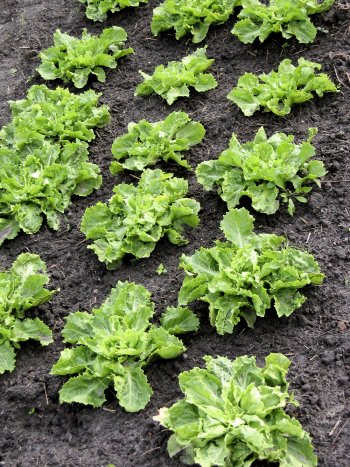Imagine working in the perfect organic vegetable garden. The weather is gorgeous, and the garden is bursting with perfectly ripened, healthy produce. It rained the night before, so there is no need to water and there is nothing to weed. All you need to do is harvest food for your dinner, then you can relax in a nearby lawn chair to sip a cool beverage and enjoy the rest of your day.
Impossible? Maybe, but you can come close to this vision if you adopt a few of the suggestions below when planning your organic vegetable garden.
Start small.
Make really big plans, but choose to plant only a tiny portion of your plan the first year. If you already have a garden and it is too big to handle, scale it back. A vegetable garden that is no larger than 4-by-8 feet is an easy size to manage.
Be safe.
Homes built before 1978 have lead paint which contaminates the nearby soil with lead. If your garden plot is close to a house built before 1978, build a raised bed and bring in fresh soil to start your garden. You can get your soil tested for lead through the UNH Cooperative Extension or your local garden center.
Plant what you like to eat.
Plant your top five favorite veggies, tuck in a couple of herbs or flowers and you will have a wonderful start to your garden. Peas, snap peas, beans, lettuces, summer and winter squashes are all easy to start from seed in the garden. You can also start with organic seedlings purchased from a local supplier to create an instant garden.
Garden in good weather.
Only work in your garden on the nicest of days. This will make a world of difference in boosting your enjoyment of the garden. Life is too short to be miserable in the garden, toiling away under the hot sun.
Don't weed.
No one likes to weed, so mulch your garden by laying down a few layers of newspaper around your seedlings then top the newspaper with straw or untreated grass clippings or chopped leaves. Mulching dramatically reduces weed growth, and it helps the soil to hold moisture so that you don't have to water very often.
Water once a week.
Watering daily is a chore that can set your plants up for failure because it encourages shallow root systems. Most plants need only about an inch of water a week. If it hasn't rained, set up the sprinkler once a week and water deeply. Deep watering promotes healthy root systems, and your well-mulched plants will be able to tolerate dryer conditions for a longer period of time.
Harvest often.
Once your garden starts producing, go out daily to harvest. Even if it is only five snap peas and three cherry tomatoes, those ingredients will make a tasty addition to your dinner salad. It's deeply satisfying to eat from your garden each day.
Learn and share.
Find friends who like to garden and go see what they are doing. Join a gardening organization. Take a workshop. Sharing your experiences with other gardeners is a wonderful way to learn new things and great way to meet new people.
Enjoy your garden.
Gardens are a place of visual joy and refuge. Plant your garden in a spot that you see daily. Put a chair next to your garden so you can sit and bask in its glory.
As you find success and enjoyment in the garden, think about what you might like to add or change the following year. Dream of a perfect garden but be realistic about what you can manage. If you can do that, you will be able to maintain a beautiful garden that not only nourishes your body but nourishes your soul as well.
Laura Morrison is an artist, vegetable gardener and co-founder and president of Capital City Organic Gardeners. For more information on CCOG, visit ccognh.wordpress.com and come to the meeting on March 21 at 6:30 p.m. at Grace Episcopal Church in East Concord to learn about seed starting with Donna Miller.









